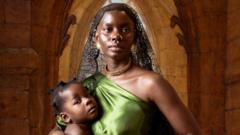Dola Posh, a Nigerian-British photographer, opens up about her battle with postnatal depression following the birth of her daughter. In an effort to reclaim her identity, she turned to photography creating meaningful self-portraits that reflect her emotional journey, aiming to inspire other black mothers facing similar challenges.
Rediscovering Identity Through the Lens: Dola Posh's Journey With Postnatal Depression

Rediscovering Identity Through the Lens: Dola Posh's Journey With Postnatal Depression
Photographer Dola Posh shares her profound experience with postnatal depression, exploring identity, motherhood, and healing through self-portraiture.
In the realm of identity and motherhood, Dola Posh's narrative is both profound and resonant. A multifaceted individual—Nigerian, photographer, woman, mother, and Briton—Dola found herself lost after giving birth to her daughter during the stringent covid lockdown. Just six days post-delivery, she lay in a hospital bed, consumed by doubts about her changed existence and whether her beloved craft of photography would ever return to her life.
Facing isolation with family members unable to visit, the pressure brewed as they called to check on her and the newborn. Having endured a challenging pregnancy, Dola felt as if her individuality had slipped away. “I thought: ‘I’m me; the baby’s out, I’m still me.’ But no, I wasn’t me anymore,” she reflected, a sentiment that echoes with many mothers, particularly black women disproportionately affected by postnatal depression, a reality she recognized only in hindsight.
Once home, Dola was bombarded with unsolicited advice on motherhood, which further clouded her sense of self, convincing her that she lacked the innate qualities to raise her child properly. “There was too much talk, too much control... It made me feel like I didn’t know what I was doing. I wasn’t given the chance to be a mother.” As the weight of the world settled on her shoulders, thoughts of despair spiraled her into a dark abyss.
One sleepless night, overwhelmed with emotion and isolation, Dola contemplated ending her life. Instead, she reached out to a health visitor, summoning the strength she thought was absent. “I buried my head in shame… I don’t have the strength to be a mother,” she admitted. However, with encouragement, Dola sought therapy, where she discovered an essential outlet: her camera.
With a background studying marine biology in Nigeria, Dola carved her niche within Lagos's competitive fashion and celebrity photography scenes before gravitating towards portraiture. This discipline empowered her to express deep human connections, a skill that now became instrumental in her therapeutic journey. Through self-portraiture, she began to formulate a poignant narrative around her experiences, capturing intimate moments with her daughter, Monioluwa.
Dola’s work drew unconscious parallels to the classic Madonna and child imagery, a connection she later recognized with the help of her mentor. Growing up amidst religious inspirations, the theme of motherhood resonated within her subconscious, shining through her portraits—her veil became a symbol of both heritage and renewed identity.
With each photograph, Dola connected with her essence, starting to understand the turbulence of her emotions. By publicly sharing her journey with postnatal depression, she dismantled the stigma surrounding the issue in the black community. “Now I am starting to work on the stories of what actually happened and the darkness, how I crawled out of it, and try to depict that through images,” she expressed.
This year, Dola’s impactful series earned her a prestigious award from camera manufacturer Leica, enabling her to further her projects and empower other mothers to voice their struggles. “I want a world where black mothers don’t feel they have to carry so much burden…to look in the media and see a reflection of themselves,” she declared with determination.
Through her brave narrative, Dola Posh champions the importance of openness regarding mental health, encouraging others to know they are not alone in their struggles. In her words, “It’s new for a woman to stand there and say: ‘I almost ended my life... I am still an artist, I am still a woman and I have something to say.’” A voice of resilience and inspiration, she continues to capture life through her lens, advocating for understanding and healing amidst the harsh realities of motherhood.





















